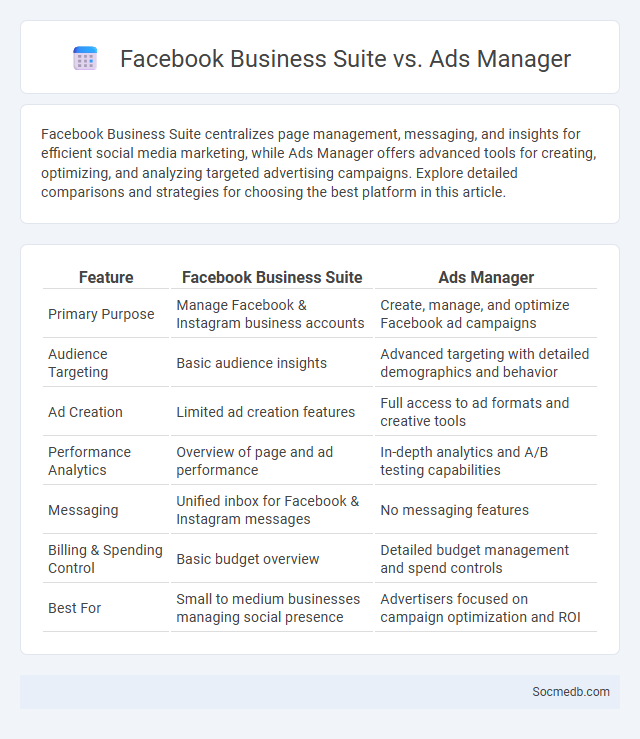
Photo illustration: Facebook Business Suite vs Ads Manager
Facebook Business Suite centralizes page management, messaging, and insights for efficient social media marketing, while Ads Manager offers advanced tools for creating, optimizing, and analyzing targeted advertising campaigns. Explore detailed comparisons and strategies for choosing the best platform in this article.
Table of Comparison
| Feature | Facebook Business Suite | Ads Manager |
|---|---|---|
| Primary Purpose | Manage Facebook & Instagram business accounts | Create, manage, and optimize Facebook ad campaigns |
| Audience Targeting | Basic audience insights | Advanced targeting with detailed demographics and behavior |
| Ad Creation | Limited ad creation features | Full access to ad formats and creative tools |
| Performance Analytics | Overview of page and ad performance | In-depth analytics and A/B testing capabilities |
| Messaging | Unified inbox for Facebook & Instagram messages | No messaging features |
| Billing & Spending Control | Basic budget overview | Detailed budget management and spend controls |
| Best For | Small to medium businesses managing social presence | Advertisers focused on campaign optimization and ROI |
Introduction to Facebook Business Suite and Ads Manager
Facebook Business Suite centralizes management of Facebook, Instagram, and Messenger, enabling seamless control over posts, messages, and notifications across platforms. Ads Manager provides advanced tools for creating, managing, and analyzing paid advertising campaigns, offering detailed targeting options and performance metrics. Together, these tools streamline social media marketing efforts, optimize ad spend, and enhance audience engagement for businesses of all sizes.
Key Features of Facebook Business Suite
Facebook Business Suite offers a comprehensive platform to manage your social media presence across Facebook, Instagram, and Messenger in one place. You can schedule posts, respond to messages, track performance metrics, and access insights to optimize your content strategy effectively. Your ability to streamline communication and analyze data helps grow engagement and improve overall marketing outcomes.
Overview of Facebook Ads Manager
Facebook Ads Manager is a comprehensive tool designed for creating, managing, and optimizing Facebook advertising campaigns. It provides detailed audience targeting options, performance metrics, and budget controls to maximize ad effectiveness. The platform supports various ad formats including image, video, carousel, and collection ads, enabling businesses to tailor campaigns for specific marketing objectives.
Comparative Analysis: Business Suite vs Ads Manager
Business Suite offers an integrated platform for managing Facebook and Instagram accounts with streamlined tools for scheduling posts, responding to messages, and viewing insights, making it ideal for small to medium businesses. Ads Manager provides advanced campaign creation, detailed targeting options, and in-depth performance analytics, catering to marketers needing granular control over ad spend and optimization. Both tools support Facebook advertising but differ in complexity and feature depth, with Business Suite focusing on ease of use and Ads Manager offering comprehensive ad management capabilities.
User Interface and Navigation Differences
Social media platforms exhibit significant variations in user interface and navigation, impacting overall user experience and engagement. For example, Instagram prioritizes visual content with a grid layout and intuitive swipe gestures, while Twitter emphasizes real-time updates with a chronological feed and quick access to trending topics. Facebook integrates a complex navigation system featuring customizable news feeds, groups, and marketplace sections designed to cater to diverse user interests and interactions.
Ad Creation and Management Capabilities
Effective social media ad creation leverages targeted audience research, compelling visuals, and persuasive copy to maximize engagement and conversion rates. Advanced management capabilities include real-time performance tracking, A/B testing, and budget optimization to ensure your campaigns deliver the highest return on investment. You can scale ad efforts efficiently while maintaining precise control over targeting and messaging across multiple platforms.
Insights, Analytics, and Reporting Tools
Social media insights, analytics, and reporting tools provide businesses with critical data on audience behavior, engagement metrics, and content performance across platforms like Facebook, Instagram, Twitter, and LinkedIn. Advanced tools such as Google Analytics, Hootsuite Analytics, and Sprout Social enable real-time tracking of key performance indicators (KPIs) including reach, impressions, conversion rates, and demographic breakdowns. These analytics empower marketers to refine strategies, optimize campaigns, and drive data-driven decisions for enhanced social media ROI.
Workflow and Collaboration Options
Social media platforms offer robust workflow and collaboration options designed to streamline communication and project management for your team. Features such as shared content calendars, real-time messaging, and integrated task assignments enable seamless teamwork and efficient content approval processes. Leveraging these tools enhances productivity by centralizing social interactions and coordinating efforts across multiple channels.
Choosing the Right Tool for Your Business Needs
Selecting the right social media platform depends on your target audience, industry, and business goals, with platforms like Instagram ideal for visual branding and LinkedIn for B2B networking. Analyze engagement metrics and user demographics to align your content strategy with platforms that offer the highest return on investment. Leveraging specialized tools such as Hootsuite or Sprout Social can streamline management and optimize posting schedules across multiple channels.
Final Verdict: Which Platform is Best for You?
Choosing the best social media platform depends on your goals, target audience, and content style. Instagram excels for visual storytelling and brand building, while LinkedIn is ideal for professional networking and B2B marketing. TikTok offers rapid growth potential with short, engaging videos, making it perfect for reaching younger demographics and viral trends.
 socmedb.com
socmedb.com